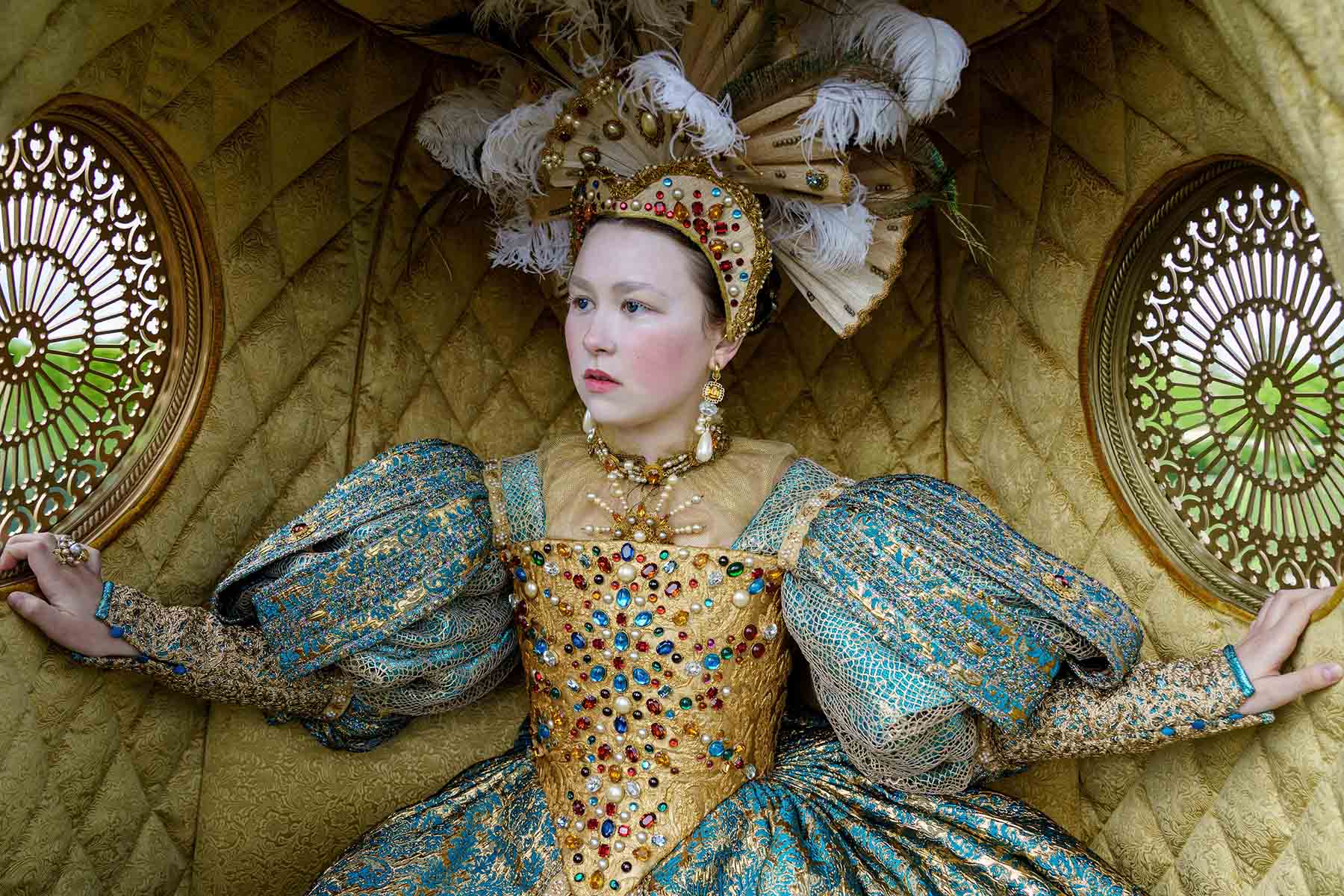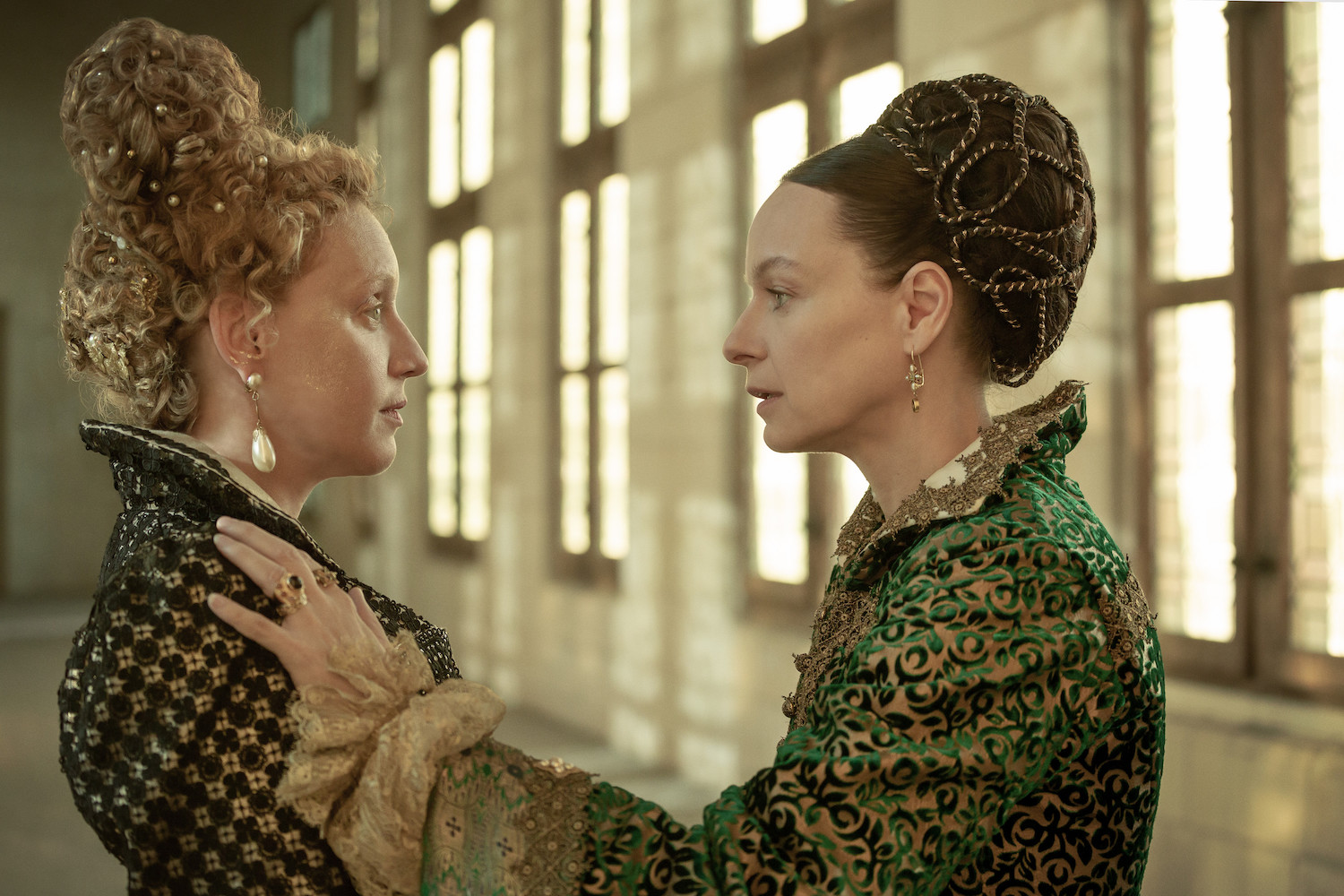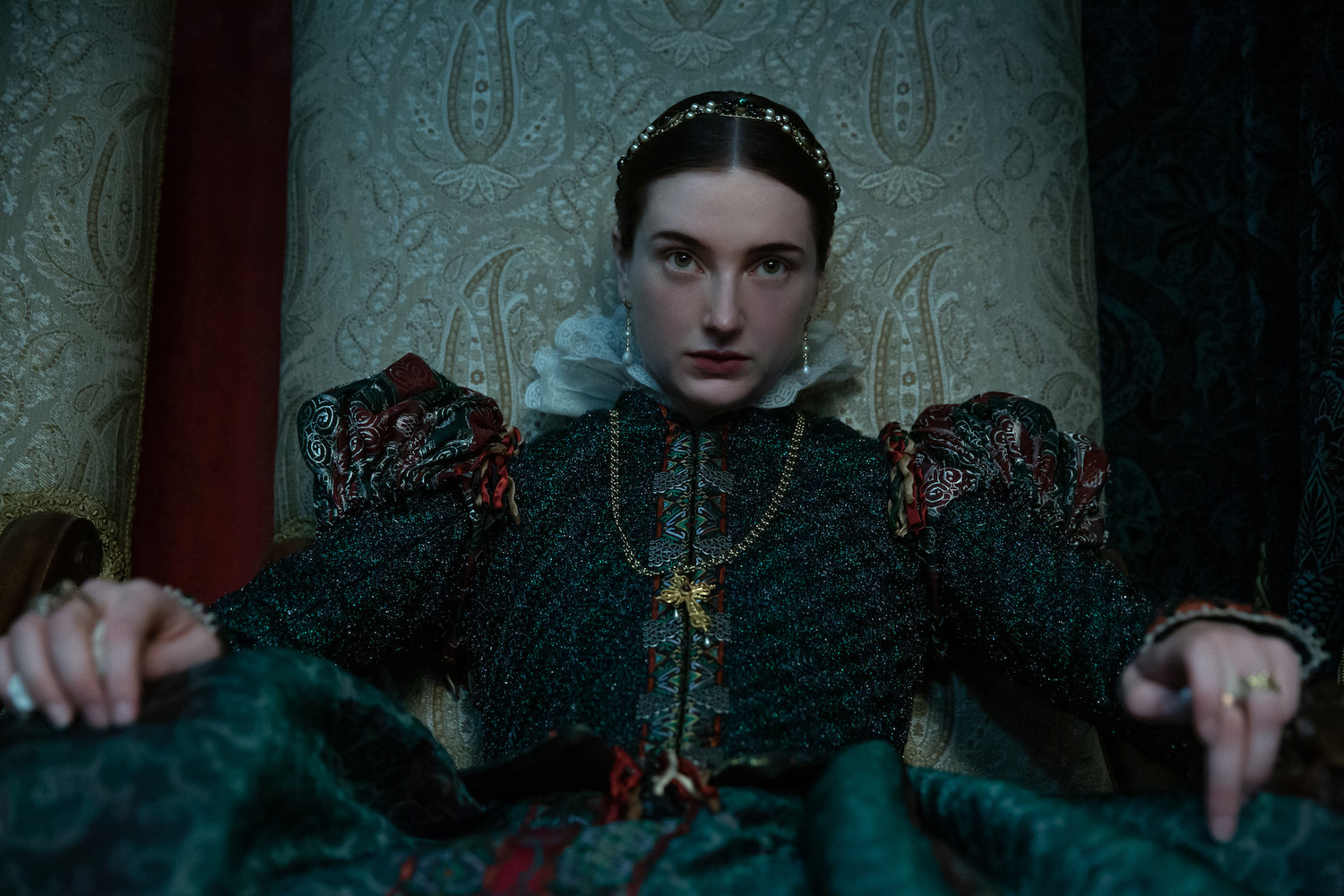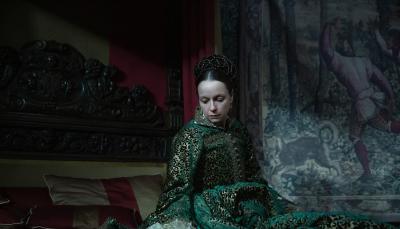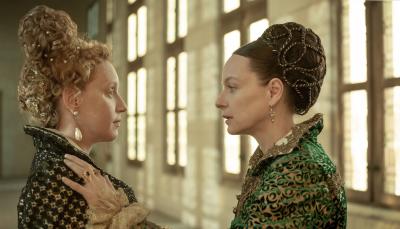Everything to Remember for 'The Serpent Queen' Season 2
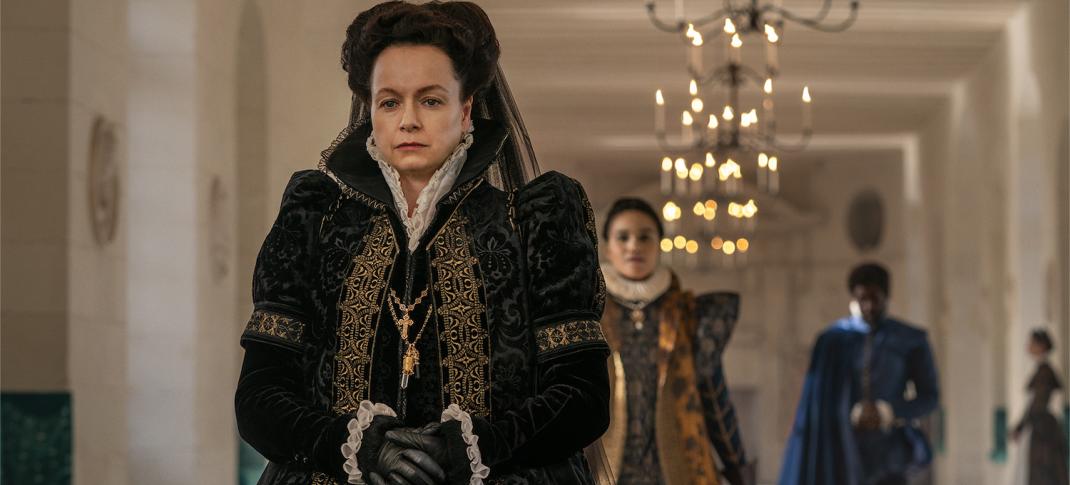
Samantha Morton and Emma McDonald in "The Serpent Queen" Season 2
(Photo: Starz)
The Serpent Queen initially aired in the fall of 2022, and though it was originally hinted to be a limited series, it was a big enough hit that Season 2 was confirmed toward the end of its run. Continuing the story of Catherine de Medici with verve, humor, and a delightful cast led by Samantha Morton in the title role, the series picks and chooses when to be historically correct. Based on Leonie Frieda’s book Catherine de Medici: Renaissance Queen of France, it fearlessly inserts modern dialogue and sentiments into the story of a queen we don’t know much about.
Her contemporaries considered her at best a vulgar upstart, at worst a dangerous poisoner and dabbler in dark arts, and a threat to the male powerbrokers of Europe. Thrown into the ruthless atmosphere of the French court, Catherine had no choice but to play the power game to survive. She not only survived, she triumphed, and by the end of Season 1, was the Regent of France, although her ambition came with a heavy price. But let’s go back to the beginning of the story, where we met the young Catherine de Medici (breakout star Liv Hill), the surviving daughter of a not particularly pleasant or aristocratic family, whose appeal lay mostly in her dowry, negotiated by her sleazy uncle the Pope (Charles Dance).
The orphaned Catherine was sent to a nunnery, where she was bullied and made to perform menial tasks; her only other option to marriage. Catherine escaped harm despite being captured during a French invasion and realized for the first time that if she were to survive, she needed to be proactive in the marriage negotiations with the French king’s second son, Henri (Alex Heath/Lee Ingleby). Catherine upped the budget and the wow factor and learned the elegant use of that new-fangled item, the fork, plus manners and dancing. She made an unforgettable arrival in France, emerging from an egg-shaped carriage and wearing elaborate Chinese-inspired clothes.
Years later, in 1560, Catherine (now played by Morton), bored with arranging her son’s coronation, told her life story (or a version thereof) to a lowly servant, Rahima (Sennia Nanua), claiming, among other things, that since childhood strange things happened around her, apparently at her command. Knowing Catherine’s reputation, the servant was scared and fascinated, falling under the spell of the Queen's charm. But she also held her own, negotiating a title and lands for her service after a thorough indoctrination by Catherine, who taught her one lesson: “Trust no one.”
Catherine's first mistake was trusting her cousin, the glamorous Diane de Poitiers (Ludivine Sagnier). Her second was falling in love with her fiancé Henri, even after finding that he was obsessed with Diane (25 years his senior) and he would always choose her over his wife. Furthermore, the couple had fertility problems for several years; Catherine knew that if she did not bear children, she could be sent back to Italy (or worse). As time passed and she failed to conceive, her standing diminished, so she turned to her magician, Ruggieri (Enzo Cilenti). He appeared and disappeared throughout Season 1, not always acting in Catherine's best interests, endangering her by using the occult.
Other members of her retinue also proved untrustworthy, playing power games within the court: her Fool, Mathilde (Kiruna Stamell), had an affair with the Dauphin, her dressmaker Aabis (Amrita Acharia) had an affair with the King, and her perfumer/poisoner Angelika (Ruby Bentall) threw in her lot with Diane, becoming her lover and drug supplier; Diane had developed a taste for liquid gold, alleged to keep her youthful. Even Catherine's majordomo, Sebastio (Adam Garcia), came to an unfortunate and gruesome end. No wonder all the servants in the palace were terrified of her.
But Catherine was brilliant, ruthless, and more capable than the Court realized. She acted as Regent when Henri went to war in Italy to claim the lands promised as part of Catherine’s dowry. Naturally, Diane accompanied him to help with (ahem) military tactics, mostly poor advice, like not leading his army into battle himself, thus damaging his reputation. He came home with souvenirs: Another mistress and her baby. Yet Catherine was the one who negotiated the costs of the war, ignoring the uncooperative Council and going straight to Parliament for funds.
Catherine started to pop out babies just in time, as Henri, on the death of his elder brother, assumed the title of Dauphin, the heir to the throne. Her eldest son, Francis, was engaged to the daughter of the King of Scotland, Mary (Antonia Clarke), better known to us as Mary Queen of Scots. But Francis died, and Catherine eased her son’s painful death with a narcotic concoction from Ruggieri, overwhelmed by grief. Mary, with the support of the Holy Roman Emperor, who was very keen on a Protestant massacre, then decided she was in line for the throne despite not having married the next royal son. But Catherine used Rahima to concoct a plot to return Mary to Scotland (Note: None of this is historically accurate at all, but it makes for good viewing.)
The growing Protestant movement across Europe and in France led to frequent acts of violence, with Catherine finding herself mediating between the Catholic Guise family, brothers Cardinal Charles de Guise (Raza Jaffrey) and Francois (Ray Panthaki), and Protestant brothers Louis (Danny Kirrane) and Antoine Bourbon (Nicholas Burns). In addition to providing some excellent comic relief, both families had some claim to the French throne. Catherine regarded people’s souls as their own business, an enlightened outlook out of step with the times (but a view another Queen, Elizabeth I, shared). However, when she invited the Protestant leader to make his claim to the Court, unbelievably, Diane killed him in full view of everyone and got away with it.
The balance of power was upset again when King Henri was severely injured in a jousting accident, taking a lance to the eye. It did not kill him immediately, but he died in Catherine’s arms without any reconciliation. However, with his death, Catherine was now Regent. Diane was banished from the court, her unofficial reign finished, and Catherine’s son was crowned King Charles IX.
In the triumphant conclusion to the first season, Catherine achieved the power she so badly wanted. However, as Ruggieri frequently reminded her, there is always a price to pay. She was feared as one of the most powerful women in Europe but not loved. She left a trail of suspicious deaths behind her, and her association with Ruggieri and the occult made her even more suspect. France was in chaos, and the religious conflict came to a head in 1572 with the St. Bartholemew Day Massacre, in which it’s estimated 5,000 to 30,000 Huguenots were killed and for which Catherine, rightly or wrongly, was blamed.
Between the trailers and history, there are some tantalizing hints of what will come in Season 2: The main one is a royal visit (purely fictional) from Elizabeth I (Minnie Driver), for example. But Catherine also founded her notorious “Flying Squadron,” a group of ~80 female spies to keep an eye on her courtiers. Instructed to form sexual liaisons with powerful men at the French court, the women of the squadron reported what they’d learned back to the Queen. She also kept potential enemies or rivals busy with endless festivals, entertainments, and feasts. It is clear, however, that Catherine regarded these as more than political exercises: she reveled in them as an outlet for her creativity.
The Serpent Queen Season 2 premieres on Friday, July 12, on both Starz linear channel and its streaming service; the eight-episode series will air/stream weekly through Friday, August 30, 2024. Season 1 is available to stream in full on Starz's streaming platforms.

